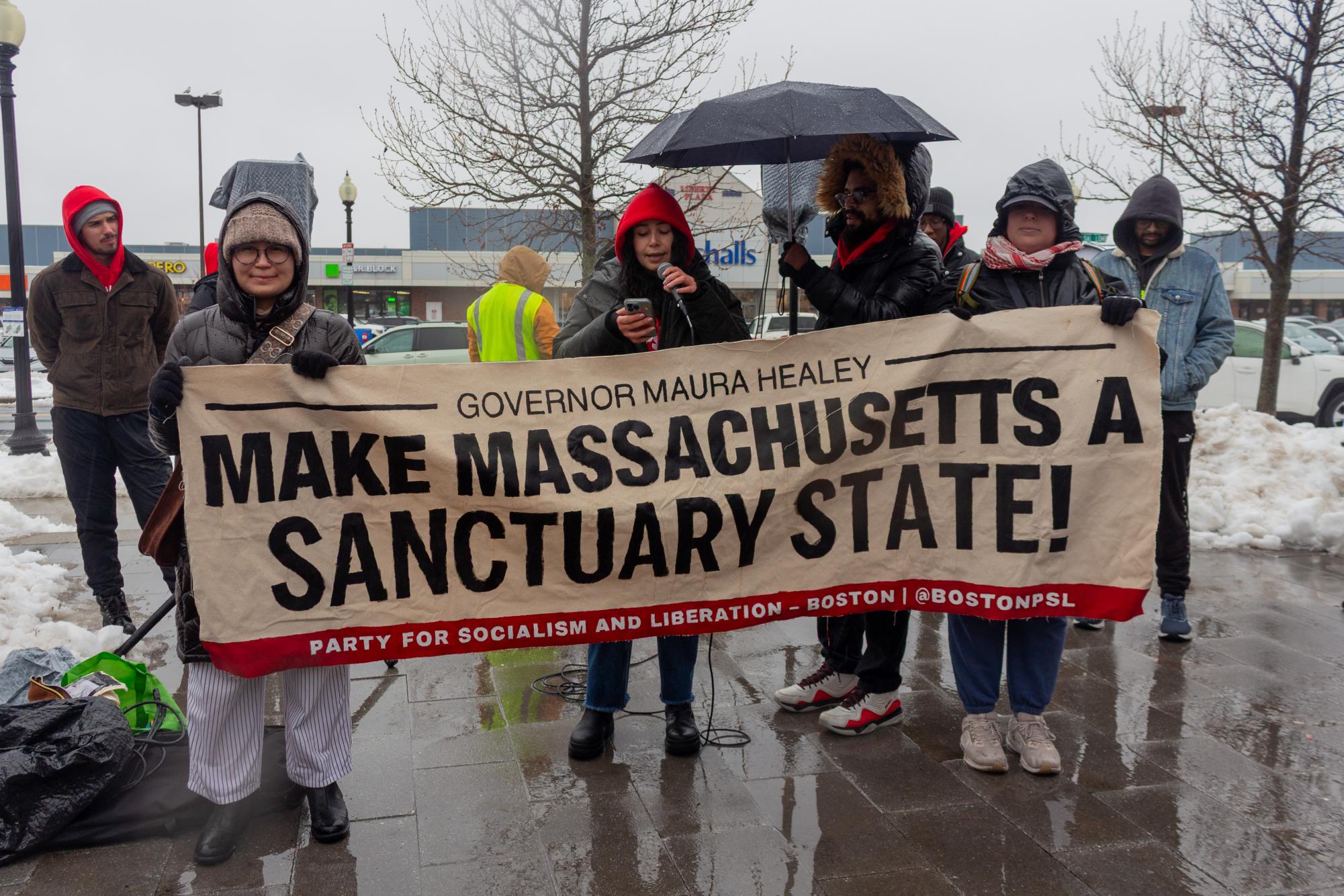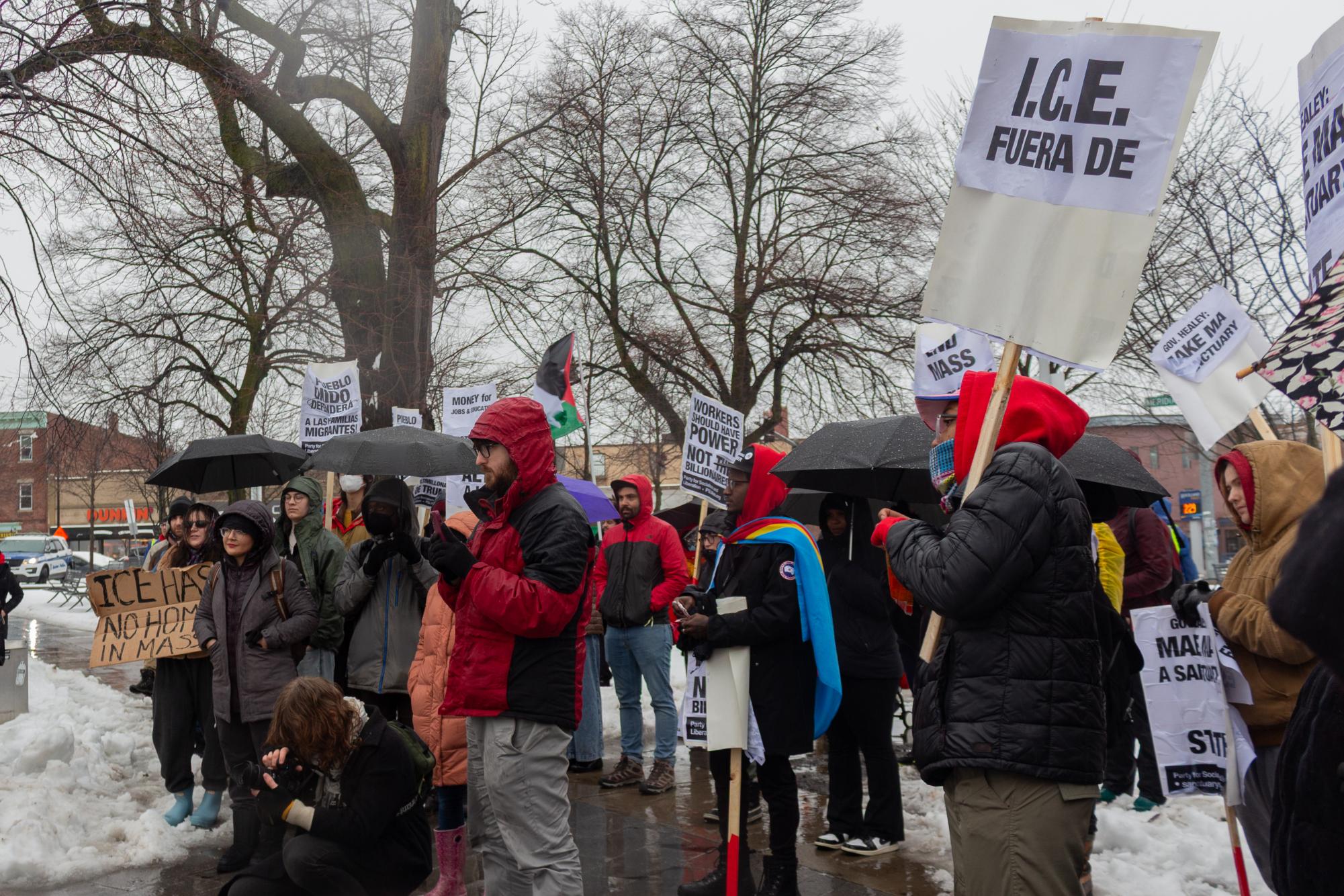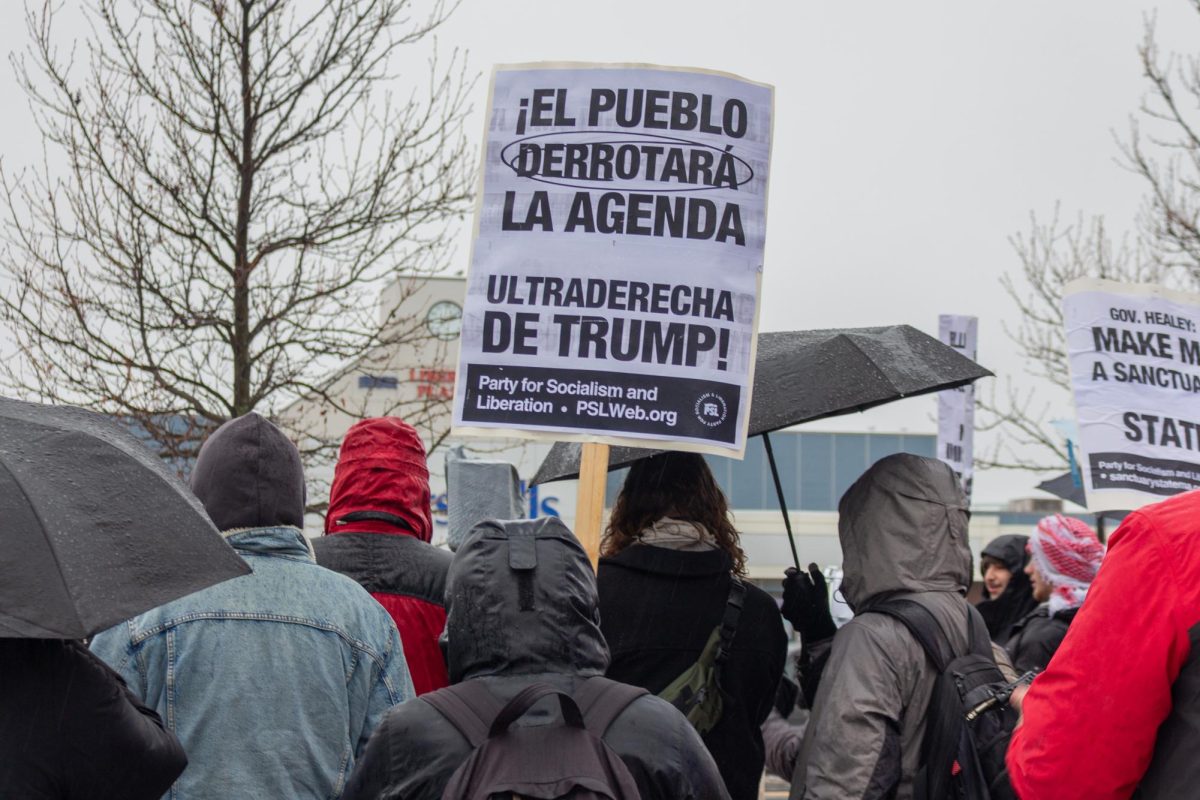A few dozen demonstrators endured sleet and rain at Central Square Park in East Boston Feb. 16 for a rally advocating the rights and protections of immigrants.
The rally was organized primarily by the Party for Socialism and Liberation, or PSL, as part of its ongoing campaign demanding that Gov. Maura Healey officially declare Massachusetts a sanctuary state. Achieving sanctuary status would protect immigrants and undocumented migrants by limiting the extent to which the state government will share information and cooperate with Immigration and Customs Enforcement, or ICE.
Oscar Estrada, an organizer with PSL, said that Healey has the ability to protect migrants with an executive order but chooses not to. He hoped that publicly protesting would help their message reach Healey.
“We’re here to demand [Healey] make Massachusetts a sanctuary state and protect the most vulnerable families,” Estrada said. “[Healey] has used her executive orders in the past, 35 [times], actually, so she knows what they are. And she knows what a sanctuary state is, she just refuses to acknowledge it.”
A 2017 Massachusetts Supreme Court ruling determined state court officers cannot detain an individual on the basis of immigration status for longer than their mandated sentence to provide ICE time to reach and deport the individual. This has led some, such as the Center for Immigration Studies, to consider Massachusetts a sanctuary state.
However, in a Jan. 22 news conference about President Donald Trump’s new immigration policies, Healey said, “Officials [in Massachusetts] follow the law. We are not a sanctuary state.”
Since Trump took office Jan. 20, ICE has been allowed to conduct numerous operations across Massachusetts, including the arrest of a Lynn teenager on charges of pushing her younger brother during an argument.
Isaiah Thomspon, an organizer with Socialist Alternative, another political organization which helped coordinate the event, handed out flyers linking to legal resources for immigrants. He said that rumors of ICE activity in schools raised one of the loudest alarms.
“In the past couple months, the Trump administration has done exactly what they said they would do in trying to ramp up pressure to carry out illegal deportations,” Thompson said. “I think the most notable thing is how [this pressure is] going directly into schools; they’re antagonizing teachers, antagonizing students. They’re also putting pressure on school administrations to not protect their teachers.”
Thompson described a recent situation in Milwaukee where a public elementary school teacher was suspended without pay after distributing information about the district’s immigration policies to her students despite having not violated any of the school’s policies regarding dissemination of information. The Milwaukee branch of Socialist Alternative conducted mass signature campaigns to spread awareness about the incident and encourage locals to protect the teacher’s rights and the rights of other educators who could be targeted, Thompson said. Amid rumors of ICE targeting Massachusetts schools, particularly higher education institutions like Northeastern, Thompson said that ICE activity is likely to occur but also to be met with even more opposition from citizens.

“It’s only one ratcheting step on the ladder, so it makes sense that [ICE] would start actually going into higher education communities,” Thompson said. “But I think a lot of people would definitely be ready to come out en masse, especially once it starts to get a little bit warmer.”
Jennifer Barrios, a graduate student at Harvard University studying human development and education, heard about the demonstration on social media. Barrios said she and fellow students have already received communications from Harvard regarding possible ICE activity.
“We’ve actually received a few emails about how to prepare ourselves in case they [ICE agents] do show up on our university campuses,” Barrios said. “I haven’t experienced anything firsthand, but I do know that folks are spreading the word.”
At Northeastern, there has been only one reported communication from an academic department, specifically the department of sociology and anthropology, on the Boston campus regarding how to handle potential ICE encounters, as reported by The Huntington News earlier this month.
Information about how to handle encounters with ICE has proven to be effective in protecting local individuals and businesses. Barrios and Estrada both described an example that occurred just across the street from the demonstration at Restaurante El Jardin, a popular local Colombian restaurant.
Allegedly, ICE agents wearing no uniforms or vests entered the restaurant, identified themselves as officers to business owner Walter Castañeda, and demanded a list of all employees with their social security numbers and immigration status. Castañeda was aware of his rights and those of his employees, which dictated that the officers required documentation to enter his business and that he had a right to have a lawyer present, and he successfully turned the officers away.
“That [situation] is why it is incredibly important for us to know our rights and share that information so that we can protect one another,” Barrios said.
“Here in East Boston, we’ve had undercover ICE agents ask for restaurant owners to give them their list of their employees,” Estrada said. “But because of the work we’ve been doing, and because we’ve been teaching everybody their rights, as well as with other organizations, they refused and turned ICE away.”
Along with organizing demonstrations, PSL distributes information to communities and businesses that are most vulnerable to profiling. For Estrada, that work is often quite personal.

“We’ve been trying to reach the communities that are affected the most, i.e., the immigrant communities. I myself am an immigrant from Guatemala, so I very much know the struggle of having to deal with these obstacles,” Estrada said. “You’re not set up to win as an immigrant. You’re not set up to win as someone of the working class here. This struggle is very personal to me, and we’ve been doing our best to reach folks who have the similar struggle.”
The event was held on the eighth anniversary of the Day Without Immigrants demonstrations in 2017, when many New York-area workers called out of work in protest of immigration policies from Trump’s first term as president. Anton Castro Del Rio, an activist with PSL and Boston-based organizing platform encuentro 5, said that remembering such history is vital to gaining momentum as a movement.
“Nothing that we have, as workers, as humans, as communities of oppressed peoples, has been given to us,” Castro Del Rio said. “Everything has been taken by the struggles of previous generations and the way that is done is by the consistent showing up in the streets and the consistent organizing and mobilizing of masses.”
Castro Del Rio described how threats to immigrants from the Trump administration are one issue among many more that are fueling a mass movement of citizens.
“There is a mass movement happening,” Castro Del Rio said. “People are fed up for several reasons. The prices of food are up. The prices of property are up. Salaries are not going up. And then the new administration is implementing these horrible policies that are forcing people to the edge. It now seems that the only solution to these very severe problems that we have is organizing and mobilizing.”
Estrada also said that it is important to remember the history of these struggles as the movement continues.
“It’s not just now. It’s always been happening,” Estrada said. “We’re going to keep fighting to make Massachusetts a sanctuary state, we’re going to keep fighting to make sure our immigrant neighbors are safe, feel safe and know their rights and we’re going to make sure that Maura Healey understands that we’re not going to back down and we’re not going to let we’re we’re not going to let our neighbors live in fear.”
Castro Del Rio urged more people to get involved in local activism and to build strong bonds with communities.
“Please become involved in a cause that impacts your communities. Get to know your neighbors and remember that revolution is a multigenerational fire that burns within us,” Castro Del Rio said. “Please stoke your revolutionary fire and stoke the fires of those that are next to you. That’s a real revolution.”











